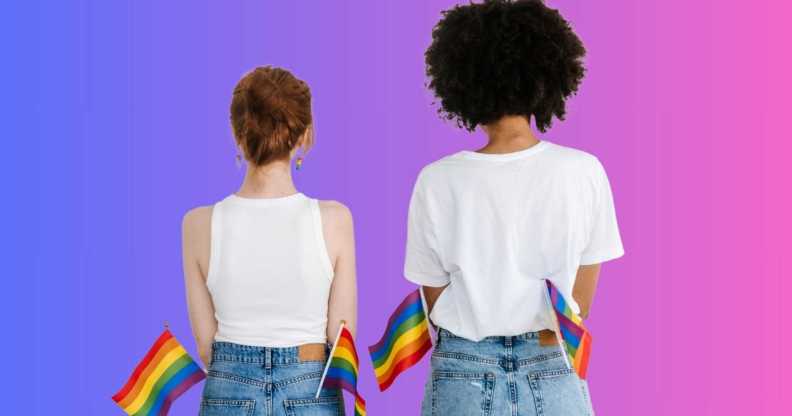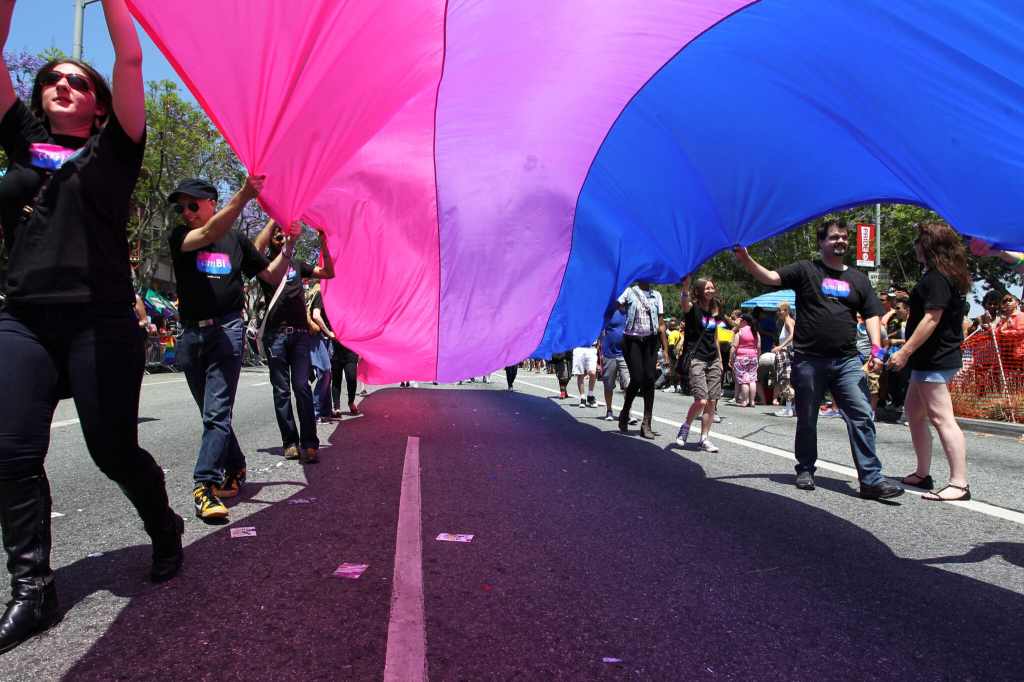‘Biphobia stress affects my physical health’: Are bisexuals destined to be chronically ill?

(Getty Images)
A new study has revealed that bisexual women are four times more likely than heterosexual people to have long-term physical and mental health problems.
The stereotype of the chronically ill bisexual has long been laughed about between LGBTQ+ disabled friends, and now there’s clear evidence that bisexual people – particularly women – are more likely to experience long-term health issues, the question that remains is, why?
Well, research suggests that disabled people make up a significant portion of the LGBTQ+ community, with one study from 2022 estimating that as many as one in three LGBTQ+ people have a disability. LGBTQ+ folks appear to be disproportionately sick all around.
Brighton and Sussex Medical School’s new study, published in the Journal of Sex Research in July, reviewed the 2015/16 English General Practice Patient Survey dataset to compare health outcomes of lesbian, gay and bisexual (LGB) individuals to those of heterosexual patients.
It found that chronic physical and mental health problems were twice as likely to appear in LGB groups compared to heterosexual groups, and bisexual women in England were four times more likely to experience health issues.
Due to limitations in the survey’s design, the authors were unable to explore the health inequalities faced by transgender and non-binary people.
Across all genders, LGB groups self-reported a significantly worse quality of life compared to heterosexuals and were less confident in managing their own health.
And there are hordes of bisexual, chronically ill people who recognise themselves in the data.
“Honestly, it isn’t surprising; I know a lot of bisexual people who are chronically ill,” May*, a 26-year-old digital sex worker who has a combination of chronic illnesses, including fibromyalgia, hyper-mobility, and post-traumatic stress disorder (PTSD), told PinkNews.
“It feels like I’m just reading data for something I intrinsically already knew.”
Are worse health outcomes for LGBTQ+ people down to minority stress?
The causes of this inequality are unclear, and the data does not yet provide answers. However, Professor Carrie Llewellyn, one of the study’s lead authors, believes that “minority stress” could be a significant contributing factor.
“Minority stress could put bisexual individuals at increased risk of psychological problems and negative behaviours,” Llewellyn says, “and ultimately at greater risk of poorer health outcomes.”
The minority stress model does not just apply to LGBTQ+ people – it explains the high levels of stress experienced by stigmatised minority groups and the impact on their well-being.
“It describes the intersectionality between intrinsic and extrinsic factors, which increase the likelihood of lowered resilience and increased stress in those who identify as having intersectional psyches,” LGBTQ+ psychotherapist Zayna Brookhouse tells PinkNews.
“The more intersectional and minority you identify as, the more chance there is that minority stress will play a part in your mental health and how you process it.”
Minority stress is triggered by numerous factors, such as interpersonal prejudice and discrimination, a lack of social support, and low socioeconomic status. Over time, consistent external or internal prejudice causes stress responses, like anxiety or heart palpitations, that contribute to poor mental and physical health.

Constantly modifying or hiding parts of yourself to adapt to a heteronormative society inflicts immeasurable pressure on LGBTQ+ people, and the Brighton and Sussex study shows that it takes a toll on long-term health, too.
“When there is a disconnect between what society wants you to be and who you actually are, the mental and physical impact can be overwhelming,” May says.
“The pressure that bisexual people feel to fit into a rigid box of sexuality is immense. In a world that is defined in black and white, it is unacceptable to exist in the grey.”
A culture of disbelief in the medical profession
The impact of feeling othered and the chronic stress it invites worsens when combined with uninformed interactions with medical professionals.
“The stigma of being seen as inherently promiscuous due to being bisexual has impacted the way I am treated by doctors,” May continues. “We are seen as reckless, and so anything that is ‘wrong’ with us is either in our heads or the result of our ‘risk-taking lifestyle’.”
Many who live with a chronic illness, especially people assigned female at birth, can attest to systemic disbelief for long-term sick patients, whether their condition is mental or physical. This type of rejection leaves chronically ill LGBTQ+ people feeling left behind by a health system too underfunded, exhausted, or too prejudiced to help.
“I cannot go to a doctor without them saying, ‘You’re too young to have X symptom!’ and it makes me so angry,” added May. “It has caused me a lot of medical trauma to have to feel like my healthcare is entirely in my own hands.”
Chronically ill and disabled people rely more heavily on healthcare and spend more time with doctors than the average person, so when prejudice dictates treatment, it has a far greater impact.
“Dismissal within healthcare results in lost access, lost hope, and even lost lives,” says Tori Ford, executive director of Medical Herstory and doctoral research fellow at the University of Oxford.
“Even one negative experience can have ripple effects where people can avoid or disengage from healthcare, which is why it’s so important for healthcare providers to lead with compassion and empathy.”
In response to this culture of disbelief, some manage their day-to-day health independently.
“I’m now much better able to accept my reality and stop fighting it, which means I can listen to my body and react based on instinct rather than best guesses from medical professionals with no experience of my condition,” 32-year-old Kim Slater, who has idiopathic intracranial hypertension, tells PinkNews.
A lack of acceptance inside and outside of LGBTQ+ community spaces may also expose bisexual people to additional stress.
“In heteronormative spaces, I can face homophobia, and the queer community holds a lot of biphobia,” says Slater. “Nowhere can be assumed to be safe. This means hiding myself over and over again, which doesn’t just cause anxiety and stress but builds up over time and impacts physical health too.”
To salvage their health and resist the exhaustion of daily minority stress, chronically ill bisexuals have turned to loving and supportive online communities. Sometimes these groups play a key role in moving health journeys forward, like they did for May.
“Since doctors don’t take me seriously, I have collaborated with other chronically ill people in discussing my symptoms in order to see what I can do at home to manage them,” they say.

But salvation in an online world isn’t enough to improve health outcomes for LGBTQ+ folks. Medicine and society must collaborate to fix this inexcusable gap in healthcare.
“Advocating for better healthcare starts with acknowledging that advocacy needs to come from everywhere, both patients and providers,” Ford explains. “It starts with creating more equitable and inclusive consultations that allow patients to bring their full selves to the table and work collaboratively about long-term care plans.”
Radical and unapologetic self-love and self-acceptance also play a crucial role in improving LGBTQ+ people’s well-being, reducing daily stress and its knock-on effect on physical health.
“It is such a radical act of love to accept yourself as you are and to know you have value simply because you exist,” May concludes.
“Acceptance of who you are is a lifelong journey, especially when it comes to sexuality and disability.”

